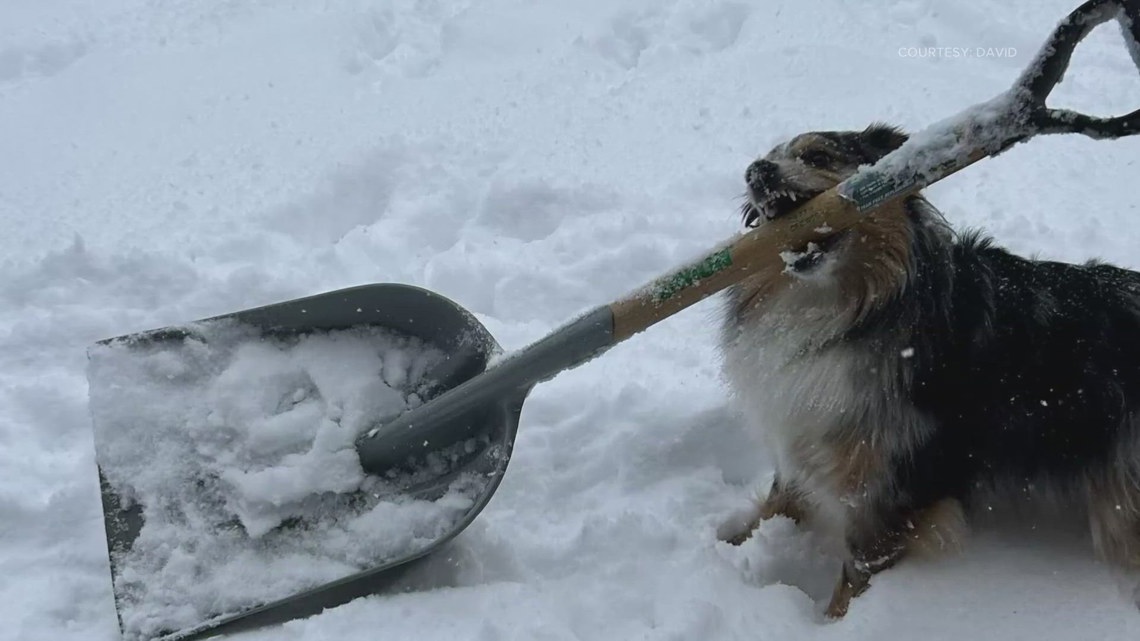In most places, you’ll need to get your sidewalks shoveled within 24 hours after the snow stops falling.
DENVER — A powerful winter storm is leaving its mark on Colorado.
In many places in the Denver metro area, residents have 24 hours after the snow stops to get the sidewalks around their home cleared, or they could face fines. It’s also just a courteous thing to do.
And don’t forget about your neighbors who might need help moving all that snow.
The City of Denver reminds residents that residential plows do not carry deicing material but can be helpful in clearing a path for drivers to get to main streets in big storms, and can help prevent deep ice rutting.
Below you can find the rules for cities and counties around the metro area, as well as some resources for those who might need assistance.
LATEST FORECAST: Major winter storm moving into Colorado
Shoveling rules
Arvada
The Arvada Municipal Code requires that residents remove snow, ice and slush from sidewalks within 24 hours after the end of a snowfall.
Arapahoe County
Sidewalk cleaning is the responsibility of the property owners and they should keep sidewalks abutting their property clear of the natural accumulation of snow and or ice. Snow and or ice should be removed within 24 hours of the last accumulation.
Fire hydrants on private property need to be cleared by the property owner to enable fire department access to the water in case of a fire.
Aurora
Residential property and business owners must remove snow and ice within 24 hours after a snowfall ends. If a snow emergency is declared by the city, they have 48 hours to clear the sidewalks.
An administrative fee of $25 for single-family and $50 for all others will be imposed after 24 hours and again after 48 hours if the snow is not removed. The city’s contractor will then be requested to remove the snow and/or ice, and the property owner or financial institution will be billed.
Chronic violators will also be issued a summons to appear in Aurora Municipal Court. Officers are not required to give a warning notice prior to issuing a snow ticket.
To make a complaint about a property that has not been shoveled, contact Access Aurora at 303-739-7000.
Boulder
City of Boulder property owners, landlords and tenants are required to remove snow and ice from their sidewalks within 24 hours after snow stops falling. Failure to remove snow from sidewalks before the 24-hour deadline may result in fines and having to pay for a private snow removal contractor.
Boulder’s Code Enforcement Officers can issue a summons to anyone who does not comply. The fine for a first offense is $100. The maximum fine is $1,000 and 90 days in jail. To report sidewalk snow removal violations, call Code Enforcement at 303-441-1875.
Broomfield
Snow must be removed from public walks no later than noon of the day following the snowfall.
Centennial
The city does not have an ordinance requiring snow to be removed from sidewalks; however, the city strongly encourages residents to remove snow from their sidewalks within 24 hours after a snowstorm ends.
Commerce City
The city’s municipal code requires that residents and businesses remove snow and ice from public sidewalks around their property within 24 hours of the last snow accumulation.
Failure to clear your sidewalk may result in a Notice of Violation from Neighborhood Services, which allows 24 additional hours for snow and ice obstructions to be removed before a $100 fine is issued.
This ordinance applies only to public sidewalks – not driveways or walkways within your property.
Report a violation by visiting here or calling 303-227-8860.
Denver
Denver requires that property owners clear snow and ice from their sidewalks, including adjacent ADA ramps.
As soon as the snow stops falling, businesses need to begin clearing their sidewalks immediately. Residences need to clear their sidewalks by the next day.
Inspectors will leave a time-stamped notice at properties with un-shoveled sidewalks. After receiving a notice, businesses have four hours and residences have 24 hours before the inspector’s re-check and a potential $150 fine.
If it has been more than 24 hours after a snow event and sidewalks near you are still not shoveled, please contact Denver 311 to provide the address of the unshoveled sidewalk.
Highlands Ranch
Residents must have snow shoveled within 24 hours after the snow stops. This includes areas in front of and along the sides of homes and adjacent mailboxes and fire hydrants.
Report problems through Douglas County Public Works by calling 303-660-7480. Residents may also contact the Highlands Ranch Metro District at 303-791-2170.
Lakewood
Residents and businesses have 24 hours after the end of a storm to clear any sidewalks adjacent to their property, including front, sides and any pedestrian ramps leading to the street. The law also prohibits shoveling snow into the street.
If it is more than 24 hours after a storm ends and a sidewalk has still not been cleared or if a previously cleared sidewalk has been covered by city or state plows, you can report it by visiting Request Lakewood.
Littleton
Residents and businesses are required to remove snow from sidewalks and other public right-of-ways on their property (including RTD bus stops) within 24 hours after snowfall has ended.
Longmont
Longmont Municipal Code states that you have 24 hours after a storm ends to clear your sidewalks. Here is the complete code related to clearing sidewalks.
Thornton
It is unlawful for any owner, agent or tenant of any lot, block, or parcel of land within the city to allow any snow, sleet, ice, or other obstruction to accumulate or remain upon any sidewalk adjoining such lot, block, or parcel of land within the city for longer than 24 hours from the time of the last accumulation of such snow, sleet, ice, or other obstruction.
Westminster
Residents are required by City Code 8-1-10 to clear their sidewalk within 24 hours of the end of a storm. Uncleared sidewalks can be reported to Code Enforcement at 303-658-4432.
Wheat Ridge
Under the ordinance, the owner, occupant or tenant of any building, property or lot within the city must remove snow and ice from all sidewalks adjacent to such building, property or lot and running parallel to any street within 24 hours after each snowfall of two inches or more.
Failure to do so could result in a summons or the city may remove the snow or ice at the cost of the home or business owner.


Shoveling snow can increase your risk of a heart attack. People with underlying health conditions and those who don’t exercise regularly have a higher risk of suffering from a heart attack while shoveling, medical experts say.
Below are some options for people who may need assistance shoveling.
Shoveling assistance
Denver’s Snow Angel program
The Snow Angels program is an initiative of the Agency for Human Rights and Community Partnerships that is aimed to assist residents in Denver in need of assistance shoveling their front sidewalks during the cold winter months.
People in need of assistance can email snowangels@denvergov.org with their name and address. They will then be matched with a volunteer snow angel. People who want to help can use that same email snowangels@denvergov.org to sign up as a volunteer.
Snow Busters
If you’re unable to shovel, you can contact Snow Busters, a volunteer program operated by the City of Aurora. The program requires people to sign up and be matched with a volunteer prior to a snowstorm. This year, The City of Aurora will provide snow shovels to new volunteers of the program. If you’d like to help a neighbor in need, click here.
To be eligible to receive free assistance, the individual must:
- Be a resident of Aurora
- Be over 60 years of age or a person who is physically challenged
- Have limited financial resources (maximum income of $21,000 for a 1-person household and $27,000 for a 2-person household)
- Be unable to shovel his or her sidewalk
Boulder’s Shovel-a-Stop program
Boulder’s Shovel a Stop Program is an effort to increase the number of bus stops cleared after each snow event. The current snow and ice removal budget supports contractors hired by the city to clear approximately 40 high-ridership stops after snowfalls resulting in at least two inches of accumulation.
The program aims to bolster that number with community volunteer support. Clearing bus stops helps prevent slips and falls and increases safety and accessibility for bus riders of all ages and abilities.
Is there one we missed? Let us know about it by emailing webteam@9news.com.








More Stories
Starbucks giving away reusable red cups
COP 29: Developed economies must learn to prioritise lives over profits
Amazon launches an online discount storefront to better compete with Shein and Temu